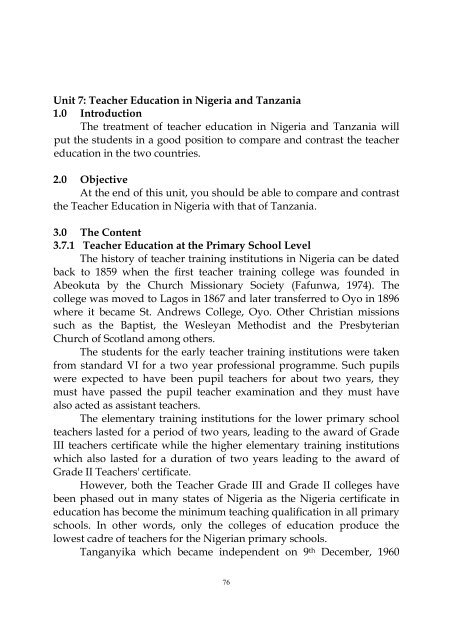edu 304 - comparative education - National Open University of Nigeria
edu 304 - comparative education - National Open University of Nigeria
edu 304 - comparative education - National Open University of Nigeria
You also want an ePaper? Increase the reach of your titles
YUMPU automatically turns print PDFs into web optimized ePapers that Google loves.
Unit 7: Teacher Education in <strong>Nigeria</strong> and Tanzania<br />
1.0 Introduction<br />
The treatment <strong>of</strong> teacher <strong>edu</strong>cation in <strong>Nigeria</strong> and Tanzania will<br />
put the students in a good position to compare and contrast the teacher<br />
<strong>edu</strong>cation in the two countries.<br />
2.0 Objective<br />
At the end <strong>of</strong> this unit, you should be able to compare and contrast<br />
the Teacher Education in <strong>Nigeria</strong> with that <strong>of</strong> Tanzania.<br />
3.0 The Content<br />
3.7.1 Teacher Education at the Primary School Level<br />
The history <strong>of</strong> teacher training institutions in <strong>Nigeria</strong> can be dated<br />
back to 1859 when the first teacher training college was founded in<br />
Abeokuta by the Church Missionary Society (Fafunwa, 1974). The<br />
college was moved to Lagos in 1867 and later transferred to Oyo in 1896<br />
where it became St. Andrews College, Oyo. Other Christian missions<br />
such as the Baptist, the Wesleyan Methodist and the Presbyterian<br />
Church <strong>of</strong> Scotland among others.<br />
The students for the early teacher training institutions were taken<br />
from standard VI for a two year pr<strong>of</strong>essional programme. Such pupils<br />
were expected to have been pupil teachers for about two years, they<br />
must have passed the pupil teacher examination and they must have<br />
also acted as assistant teachers.<br />
The elementary training institutions for the lower primary school<br />
teachers lasted for a period <strong>of</strong> two years, leading to the award <strong>of</strong> Grade<br />
III teachers certificate while the higher elementary training institutions<br />
which also lasted for a duration <strong>of</strong> two years leading to the award <strong>of</strong><br />
Grade II Teachers' certificate.<br />
However, both the Teacher Grade III and Grade II colleges have<br />
been phased out in many states <strong>of</strong> <strong>Nigeria</strong> as the <strong>Nigeria</strong> certificate in<br />
<strong>edu</strong>cation has become the minimum teaching qualification in all primary<br />
schools. In other words, only the colleges <strong>of</strong> <strong>edu</strong>cation produce the<br />
lowest cadre <strong>of</strong> teachers for the <strong>Nigeria</strong>n primary schools.<br />
Tanganyika which became independent on 9 th December, 1960<br />
76
















